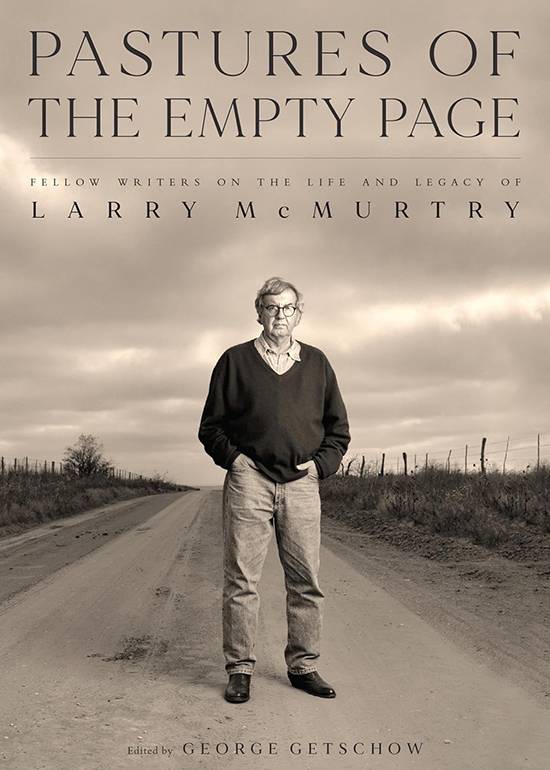Man and Myth

Pastures of the Empty Page: Fellow Writers on the Life and Legacy of Larry McMurtry
edited by George Getschow
Austin: University of Texas Press, 2023.
272 pp. $29.95 Hardcover.
Reviewed by
James Wade
For half a century Larry McMurtry helped define the Texas literary scene. From his remarkable debut (Horseman, Pass By) to his magnum opus (Lonesome Dove), McMurtry’s presence loomed larger than any other Texas writer. In Pastures of the Empty Page, editor George Getschow has collected three dozen essays from writers, friends, and colleagues of McMurtry, which speak to the late author’s influence and legacy.
The assemblage of talent in the book is impressive. Texas titans such as Lawrence Wright, Stephen Harrigan, Sarah Bird, and Elizabeth Crook all weigh in on McMurtry’s impact and authority. But while many successful writers pay tribute to McMurtry, the standout pieces in the collection are from those who knew him best. Friend and writing partner Diana Ossana; friend, student, and basically family-member, Mike Evans; and others offer insight into Larry the man, rather than McMurtry the legend. These pieces are noticeably different from the fawning recollections that dot each section, which gives the book an uneven feel—however it is this juxtaposition of literary deity and flawed human that makes McMurtry’s legacy and Getschow’s collection all the more intriguing.
The book is similar to McMurtry’s own writing in its back-and-forth between idealism and harsh reality. While McMurtry has been lauded for his realistic view of the cowboy and the modern western, his work does not completely disassociate itself with some of the more romantic notions and descriptions of the genre in the way that, say, Cormac McCarthy accomplishes in Blood Meridian. Rather, McMurtry’s writing contains both the good and the bad, and the same can be said of Getschow’s collection. There is McMurtry the great influencer, as well as McMurtry the unapproachable elitist. There is McMurtry the vulnerable writer, as well as McMurtry the harsh and unempathetic critic.
Factoids pieced together from one essay to another, like his enjoying caviar so much he had his own table at Petrossian in New York City with a polished brass nameplate, or his ruthless comments about other writers from J. Frank Dobie to Tom Robbins (speaking of McCarthy, McMurtry once said, “his early books are not very good,” and then went on to question whether McCarthy had ever written a great book) paint McMurtry in a decidedly haughty light, as do the trove of comments about his being unfriendly and standoffish when approached by other writers, journalists, readers, or pretty much anyone other than his close friends or family. However, there are also anecdotes of his spending inordinate amounts of time with those same people, offering lists of what they should be reading, giving words of wisdom that could almost be called encouraging, and opening his home and bookstores to young writers and writing students.
There are also not-so-secret bits of trivia, like that McMurtry long preferred the company of women rather than men. Several of the authors also seem to validate the idea that McMurtry intended Lonesome Dove to be satire and was frustrated when it became idolized as a great western. And one of the essays spends a few lines not determining whether McMurtry was a “crank” but rather trying to discern what specific brand of crank he was.
While the personal encounters with McMurtry appear to be a crapshoot, depending a great deal on his mood or schedule, what never altered from essay to essay was the recounting of his dedication—the deep reverence and longing with which he approached literature.
Yes, he savaged the work of many writers, but his most brutal critiques were often aimed at his work. When it came to writing he demanded an unattainable perfection from himself as well as others. His veneration of the written word was unmatched. This is what made him a true person of letters. This is why, despite the uneven recanting of Larry the man, McMurtry the legend will forever be carved into the American literary conscience.
Pastures of the Empty Page is a chronicling of encounters and anecdotes. It speaks to McMurtry’s relationships with women, the West, and the various worlds he inhabited. The essays oscillate between hero-worship and less-than-flattering acknowledgments (sometimes within the same paragraph). But ultimately the book excels by offering intimate portraits of the man from those who knew him best.
James Wade is the award-winning author of Beasts of the Earth, All Things Left Wild, and River, Sing Out. He is the youngest novelist to win two Spur Awards from the Western Writers of America, and a recipient of the MPIBA’s prestigious Reading the West Award. James's work has been featured in Texas Highways, The Bitter Oleander, Southern Literary Magazine, and numerous additional publications. James lives and writes in the Texas Hill Country with his wife and children.
